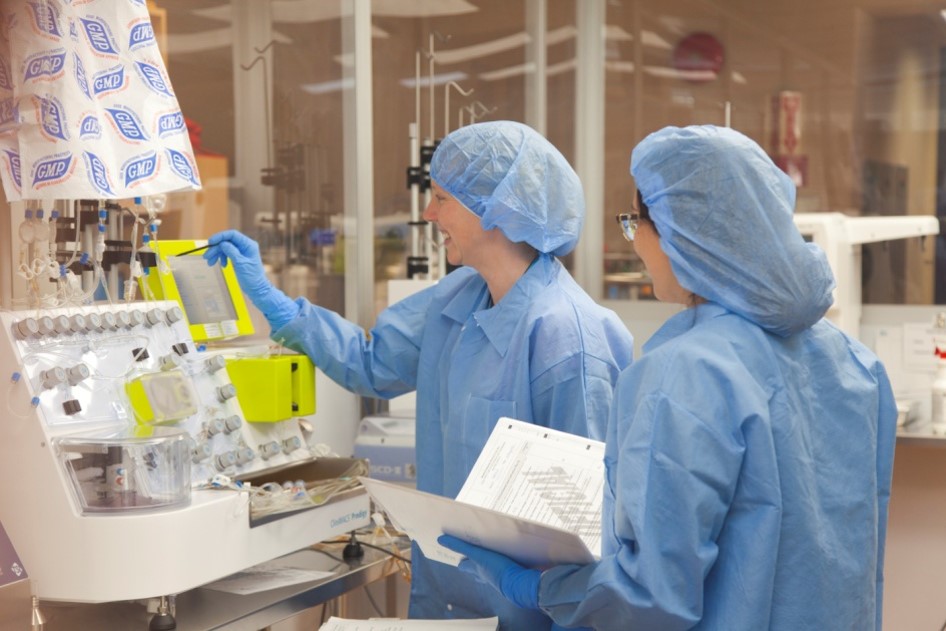By: Teffer Adjemian
Immunotherapy is among the most promising cancer treatments currently on the market and in clinical trials. By harnessing the power of the immune system, immunotherapies target cancer cells with generally fewer side effects than more common treatments like chemotherapy and radiation, and in some patients have shown remarkable efficacy in cancers that are not responding to traditional therapies. However, some types of cancer immunotherapy are extremely expensive to make – requiring specialized facilities and resources – rendering them inaccessible for many Canadian cancer patients.
The current manufacturing landscape for ‘personalized’ cellular immunotherapy is one of significant barrier to access. This manufacturing approach differs from standard drug manufacturing because it requires extracting cells from the patients’ body and transporting them to a facility, a sort of boot camp where the immune cells are expanded in number, and in some cases, engineered to target cancer cells. “The current industry standard is to use centralized, massive, expensive buildings to house the manufacturing of cellular therapy products,” Dr. Natasha Kekre, scientist and hematologist at The Ottawa Hospital, who is the clinical lead of the Canadian-Led Immunotherapies in Cancer (CLIC) program and Principal Investigator of the CLIC-01 clinical trial. “This…means that products are being shipped very far from where patients are receiving their cell collection in order to get to the manufacturing facility.” As these central manufacturing facilities are predominantly in the United States, Canadian patients have faced long wait times to receive their treatments – wait times which seriously ill cancer patients cannot afford.
Along with her colleagues Álvaro Urbano-Ispizua and Nirav N. Shah, Kekre suggests that academic point of care (POC) manufacturing can significantly lower barriers to care. With POC manufacturing, cancer immunotherapy products are manufactured at or near the hospital where the patient is being treated. Instead of being transported across the border, the cells are transported to manufacturing facilities in the same city or region – meaning the patient receives their treatment much faster. This also cuts down on expenses, as shipping and storage costs are reduced or eliminated. Many academic hospitals already contain infrastructure that would allow for POC manufacturing, meaning even the start-up costs for such a program would not be prohibitive.
At a time when the Canadian medical system is experiencing unprecedented strain, POC manufacturing could also reduce the load on the hospital system. “The Canadian healthcare and medical system is publicly funded, and our main pressure-point for cellular therapies like CAR T-cells is actually the price,” explains Kekre. “We are forced into contracts with companies and risk mitigation strategies that are specific to each company. This creates a large workload on hospital resources that include legal teams, quality control teams, and clinical staff prior to ever being able to offer these industry standard products.” POC manufacturing could reduce these intermediary fees, says Kekre, and “potentially provide an affordable solution that builds into the infrastructure… that already exists.” Implementing POC manufacturing could significantly reduce stress on the Canadian oncology and broader healthcare systems.
The CLIC program in Canada is an entirely academic network “where vector, plasmid, lentivirus and CAR-T cell manufacturing are all performed under 2 research institutes.” CLIC is currently working to establish multiple manufacturing sites in Canada for CLIC CAR T cell clinical trials, sites which will function as a trial not only for the CAR T cell therapy, but also for the POC manufacturing mode of delivery. These sites will serve to “narrow the inequality gap that currently exists with commercial CAR T-cell programs” – not competing with pharmaceutical companies but expanding access beyond what they can provide. Inspired by the Spanish system, where the Spanish Medicines Agency has approved POC CAR T manufacturing funded by the medical system, the CLIC team looks forward to a Canadian healthcare system where immunotherapy is available to all Canadian cancer patients at their point of care.
Cancer research does not stop at the lab bench; it stops when cancers are rendered curable. To reach this goal, cancer researchers need to investigate not only treatments, but methods of delivery. Researchers like Dr. Natasha Kekre and her colleagues in the CLIC program are working hard to solve one of the major issues in Canadian oncology – accessibility to cutting-edge therapeutics. The future of personalized cancer immunotherapy treatment may lie not in international pharmaceutical companies, but in our own local hospitals.
